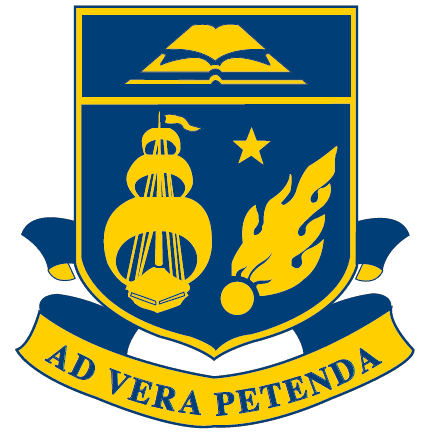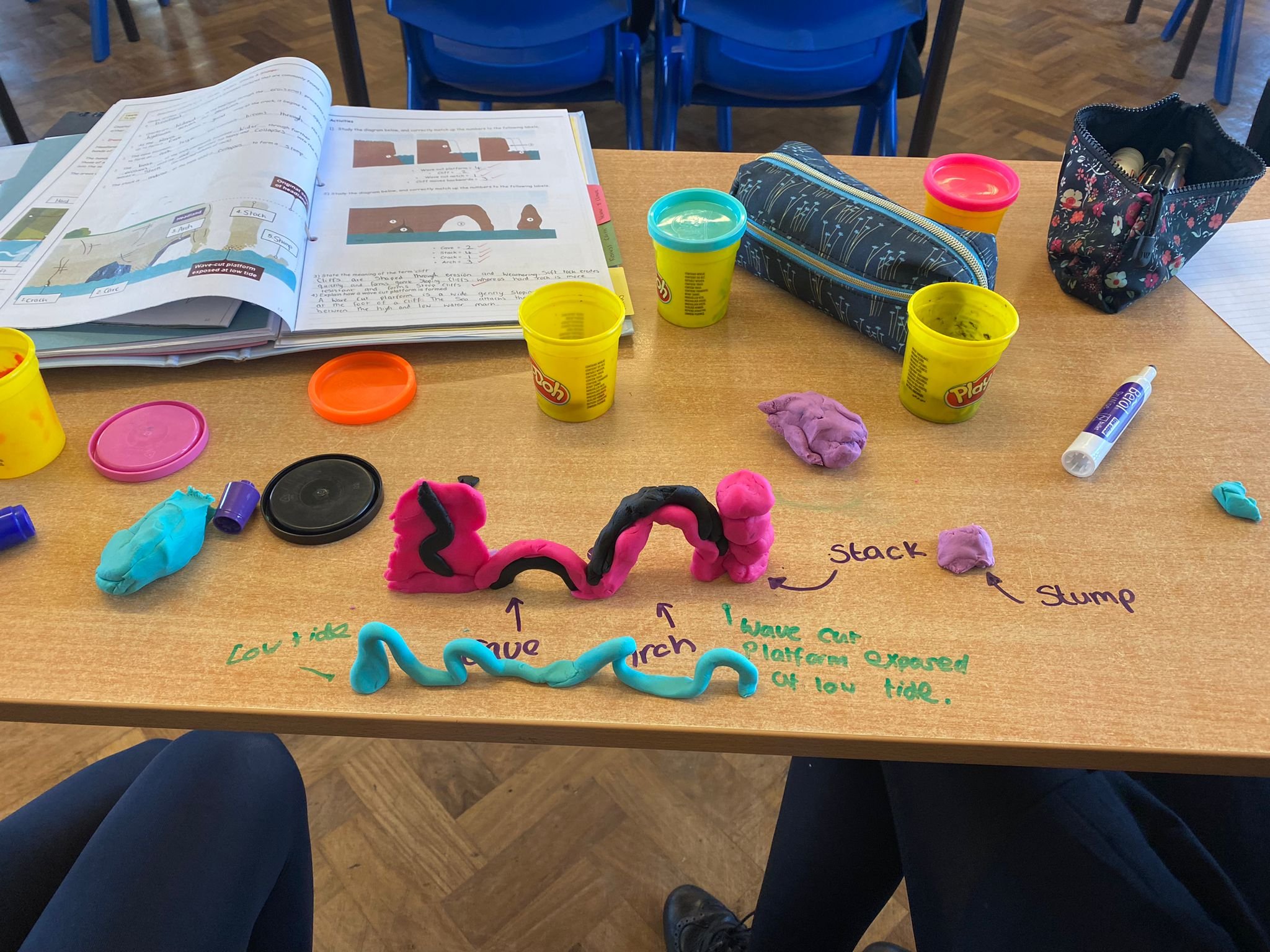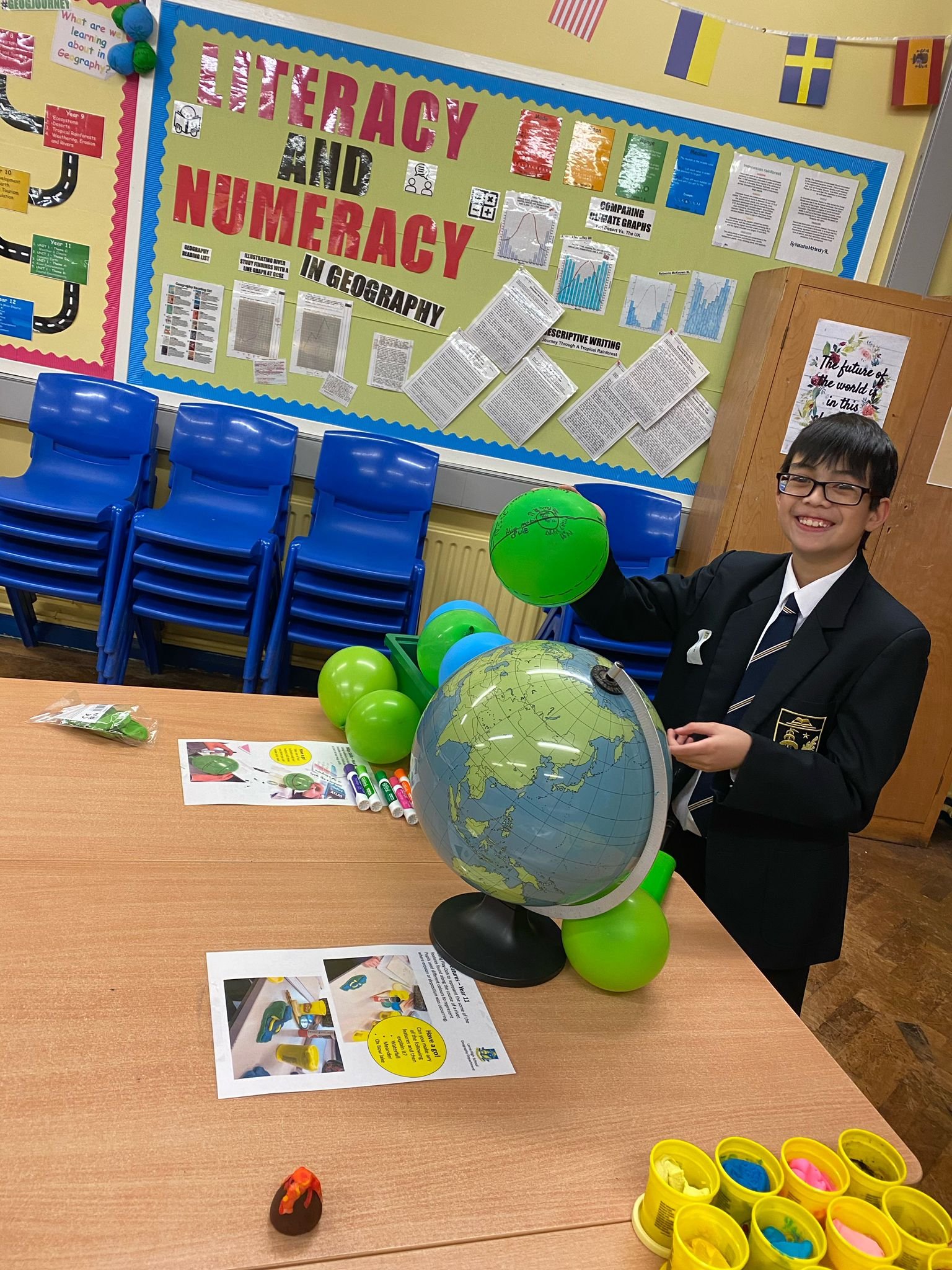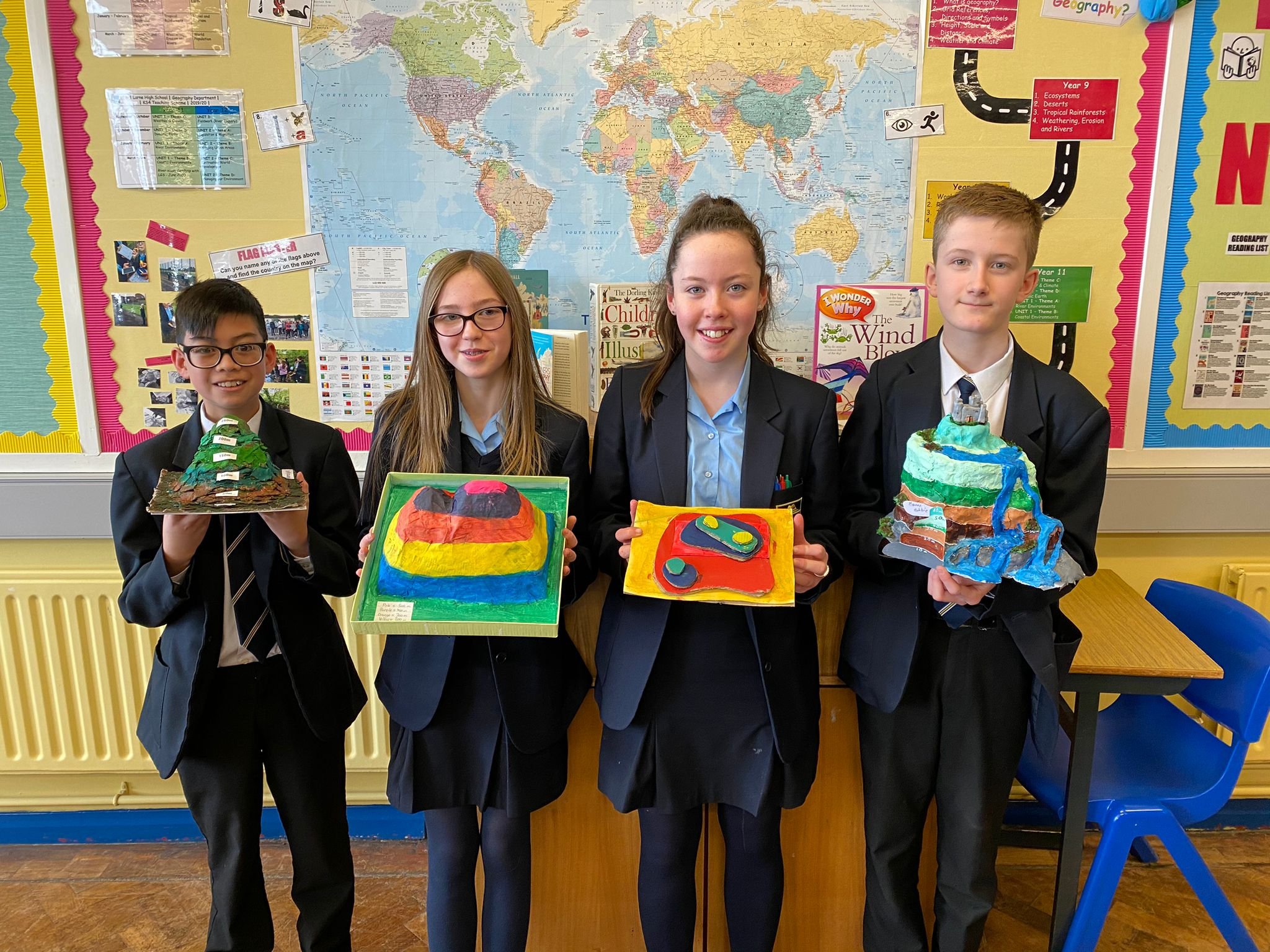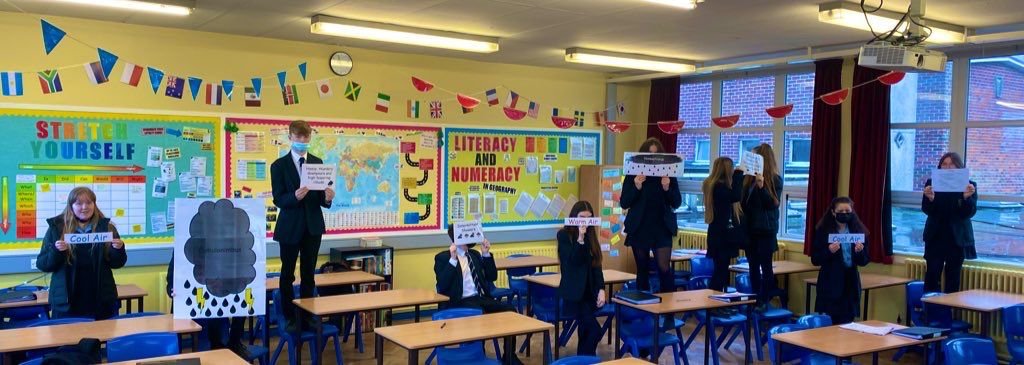Geography Department
Members of Department
Mrs A Getty (Head of Department)
Mrs F Rainey
Miss N Girvin
Aims
Geography is part of the humanities group of subjects along with history in the ‘Environment and society’ area of learning.
Key Stage 3
In Key Stage 3 Geography, pupils study both the natural and the built environment. They explore the part they can play in shaping and protecting the environment around them. The human aspect of geography also looks at society. Pupils explore their own personal space and the way societies differ globally.
Topics Covered
Year 8
What is Geography?
Where in the world do I belong?
Map skills: Grid references, direction, symbols, height and scale
Weather and climate
Year 9
Ecosystems
Deserts
Tropical rainforests
Rivers, weathering and erosion
Year 10
World development
Restless Earth
Introduction to travel and tourism
World population
Assessment
There will be 4 assessments for each year group split termly to match the 4 topics covered. The type of assessment will be knowledge based with either a focus on literacy or numeracy.
Key Stage 4
At key stage 4 our Geography department offers pupils the chance to study either GCSE geography or level 2 First in BTEC Travel and Tourism.
GCSE Geography
Aims
Our GCSE Geography specification gives students a fascinating insight into how human and physical processes interact. Students will develop their understanding of how geographical concepts affect our changing world. They examine how the growing worldwide population increases the demand on Earth’s systems. Students also develop as global citizens and recognise how they can contribute to a sustainable and inclusive future.
We also aim to extend students’ learning beyond the classroom. In year 11, they take part in a local fieldwork study to collect primary data. They then present and analyse results, draw conclusions and reflect critically on the process.
Exam Board
CCEA
Topics covered
Unit 1: Understanding Our Natural World (Physical Geography) – YEAR 11
Theme A: River Environments – Fieldwork Visit
Theme B: Coastal Environments
Theme C: Our Changing Weather & Climate
Theme D: The Restless Earth
Unit 2: Living in Our World (Human Geography) – YEAR 12
Theme A: Population and Migration
Theme B: Changing Urban Areas
Theme C: Contrasts in World Development
Theme D: Managing Our Environment
Unit 3: Field Study (Fieldwork) – YEAR 12
Assessment
Students complete 3 externally assessed units which last 1 hour 30 minutes and are set and marked by CCEA. Unit 1 and 2 are worth 40% of the final grade, and unit 3 is worth 20%.
The first 2 exam papers are made up of the 4 themes covered in the unit. Each theme asks a series of questions about the content covered in the unit. Students complete all 4 sections. Each section of the paper is worth 25% of the total marks for the paper.
Useful Websites
BTEC Level 2 First Award in Travel and Tourism
Aims
BTEC First Awards are primarily designed for use in schools as an introductory Level 1/Level 2 course for learners who want to study in the context of a vocational sector. The knowledge, understanding and skills learned in studying a BTEC First will aid progression to further study and, in due course, prepare learners to enter the workplace.
The qualification provides an engaging and stimulating introduction to the world of travel and tourism giving you the opportunity to develop knowledge and technical skills in a practical learning environment. You will explore some of the key areas within the sector, including accommodation, tourism development and promotion, transport and visitor attractions. You will investigate the importance of the travel and tourism sector to the UK, and investigate different types of customer and UK destinations. You will also have the opportunity to study international travel and tourism. You will develop key skills, such as research, report drafting and writing skills and project management.
The qualification is 120 GLH, which is the same size and level as a GCSE and is aimed at everyone who wants to find out more about the travel and tourism industry.
Exam board: BTEC qualifications are awarded by Pearson.
Topics covered
There are 3 mandatory units, covering the underpinning knowledge and practical skills required to work in the industry:
UK travel and tourism sector
UK travel and tourism destinations
the travel and tourism customer experience
You will choose one further unit from two optional units, covering more specific aspects of the global travel and tourism sector. These are:
international travel and tourism destinations
factors affecting worldwide travel and tourism
Assessment
All units are assessed against the assessment criteria set out in the specification. Once each unit grade is finalised, it will count towards the overall qualification grade (see Results and Grading).
Units are graded at:
Level 2 Distinction
Level 2 Merit
Level 2 Pass
Level 1
Unclassified
BTEC Firsts include both internal and external assessment. At least 75% is teacher-led internal assessment and up to 25% is external assessment. Internal assessment is carried out through assignment briefs that are set and assessed by teachers. The assessment for Unit 1: The UK Travel and Tourism Sector, is a test that is sent away to be marked. This test includes multiple-choice and open-ended-response questions based on main types of tourism in the UK and the different component industries that make up the UK travel and tourism sector.
Key Stage Five Curriculum
A-Level Geography
BTEC Level 3 Travel & Tourism (National Extended Certificate)
A-Level Geography
Aim:
Our A level Geography is a course aims to encourage students to examine and question the world around them. As a subject, it examines both physical and human aspects. More importantly, it explores how the physical and human world interact with each other. As a subject, A level Geography aims to make sense of the world that we live in. It encourages students to formulate opinions, challenge data, and discuss and make decisions. It is a subject that suits those who have opinions and enjoy discussion. Geography is a subject that is relevant to all of us and bridges the gap between Science and The Arts. There is the opportunity to take part in a residential fieldwork trip for Year 13. The data gathered on this fieldwork is used in AS Unit 3.
Exam Board:
CCEA
Topics covered & assessment format:
YEAR 13
AS 1: Physical Geography - Students will investigate physical processes and systems and human interaction with them e.g., fluvial environments, ecosystems and weather and climate.
AS 2: Human Geography - Students will explore issues of population, settlement, and development in a range of places across the globe.
AS 3: Fieldwork Skills and Techniques in Geography - Students will develop their practical geographical skills and techniques and take part in fieldwork to collect and process data.
YEAR 14
A2 1: Physical Processes, Landforms & Management - Students will increase their knowledge of many aspects of tectonic activity and tropical environments.
A2 2: Processes & Issues in Human Geography - Students will develop their understanding of the changing nature & characteristics of tourism and the role of people in planning & designing settlements in an attempt to make them more sustainable.
A2 3: Decision Making in Geography - This unit gives students the opportunity to develop their decision-making skills in a real world scenario.
Entry Requirements:
A level Geography builds on the knowledge, understanding and skills developed in GCSE Geography; therefore, it is strongly advised that pupils have at least a grade B in GCSE Geography to study this subject at A level.
Careers and Further Study:
Geography is a broad-based academic subject which will open up many options for you in your future. Employers and universities see geography as a robust academic subject which is rich in skills, knowledge and understanding. This subject links the arts and the sciences, and it is highly flexible in terms of what you can combine it with. If you choose to take geography on to university, there are of a range of courses at Queens University, and Ulster University to choose from. There is a massive variety of career areas which are accessed by graduates of geography such as: GIS specialists, education, climate change analyst, meteorologist, pollution analyst, surveyor, town planner, water conservation officer, international aid/development worker, logistics and distribution manager and many more.
BTEC Level 3 Travel & Tourism (National Extended Certificate)
Aim:
Our Level 3 qualification in travel & tourism aims to deliver a wide-ranging course which and includes aspects of customer care and administration, as well as the study of destinations, holidays, and attractions. There are also opportunities for course related trips and visits. This qualification is equal to one A-Level.
Exam Board:
Pearson Edexcel
Topics covered & assessment format:
YEAR 13
Unit 1
The World of Travel & Tourism - This unit provides the foundation for learners to study other units in travel and tourism. They will explore the key components and scale of the industry, using data to analyse key trends and their impact.
Unit 9
Visitor Attractions - Learners develop analytical skills as they investigate the nature and role of both built and natural visitor attractions, their commercial success, appeal, response to diverse visitor needs and the importance of delivering a memorable visitor experience.
YEAR 14
Unit 2
Global Destinations - Learners investigate and analyse information regarding the features and appeal of global destinations, travel planning, and the factors and trends affecting the changing popularity of global destinations.
Unit 3
Principles of Marketing in Travel & Tourism - Learners focus on how to develop a successful marketing plan for use by travel and tourism organisations to attract and engage customers.
Entry Requirements:
Level 3 travel & tourism builds on the knowledge, understanding and skills developed at GCSE (level 2) travel & tourism; therefore, it is strongly advised that pupils have at least a ‘merit’ grade at level 2 to study this subject at level 3.
Careers and Further Study:
This course opens many doors to careers as cabin crew, holiday representatives, and travel consultants. Travel and Tourism can also lead to a wide range of other careers in the areas of event & hospitality management, wedding planning, travel agencies, public relations, travel journalism and tourism marketing.
If you were interceded in studying a travel & tourism related degree, there are many courses offered at universities across the UK and Northern Ireland such as: international tourism management, hospitality and events management, economics and marketing, leisure, and tourism etc.
